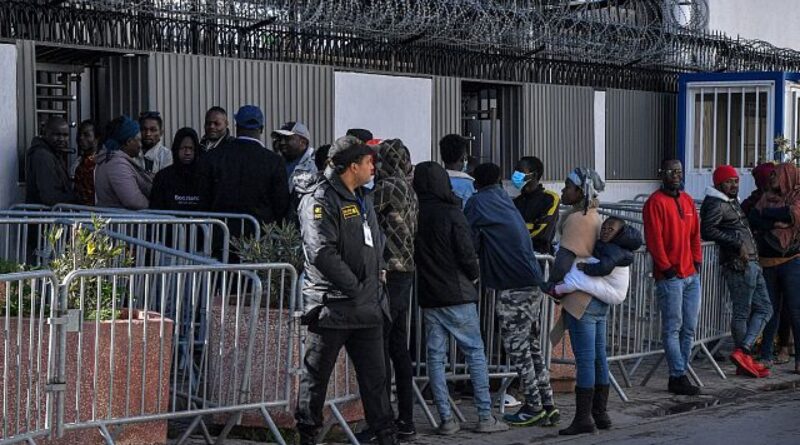Rescued Guinean migrants recount Tunisia “nightmare”
Through sobs and sighs, a visibly exhausted Ibrahima Barry and Dame Mariama Barry recount their journey home to Guinea from Tunisia after President Kais Saied triggered a storm, accusing sub-Saharan migrants of crime.
The Guineans, who are not related, returned to their home country Wednesday on the first repatriation flight since Saied ordered his security forces to take “urgent measures” against “hordes” of sub-Saharan African migrants.
Without evidence, the Tunisian president accused migrants of causing a wave of crime and plotting to change the country’s demographic make-up.
On a car ride to his brother’s house in the suburbs of Guinea’s capital Conakry, 26-year-old Ibrahima Barry described the recent events as “a wave of hatred without reason.”
“In Tunisia, if I tell you that they are savages, it is not too strong a word,” he said.
Many of the 21,000 officially registered sub-Saharan African migrants in Tunisia lost their jobs and homes overnight.
The first Guineans to be repatriated described scenes of aggression and manhunts.
“I was in bed when a friend called to tell me not to go out, that anti-black nationalism had been unleashed all over the country after a speech by the head of state,” said Ibrahima Barry, who travelled to Tunisia for university in 2019.
The next day, neighbours broke into his home in the city of Gabes and ordered him not to move.
He said his landlord saved him, forcing the intruders to leave and then driving him the 400 kilometres (250 miles)to the Guinean consulate in Tunis.
“In my neighbourhood, black people were sought out, chased, raped, and their homes looted by Tunisians”, he said, adding they were sometimes assisted by police..
Beatings and racial slurs
“All they had to do was see a black person, even one sitting in front of his door or in town, and they would attack him with stones or sticks (…) It’s a nightmare that we lived through in Tunisia,” said Ibrahima Barry.
“An African who treats another African like that is simply inhuman, savage.”
Since Said’s speech, hundreds of sub-Saharans have registered with their embassies on repatriation lists.
The Guinean junta was the first to bring back some 50 nationals on Wednesday evening.
Dame Mariama Barry, 27, told AFP she has lost everything.
Having arrived in Tunisia in 2022 in the hope of reaching Europe, she had been working in a hairdressing salon in Tunis for eight months.
“I was forced to accept everything, even the unacceptable,” she said, noting that she experienced racism by Tunisians.
After the president’s speech, things got worse, she added.
“My boss insulted me,” using a racial slur, she said, “calling me… an adventuress without origin, a bad girl,” she said. “That’s when I realised that I had to leave, and very quickly.”
Her neighbourhood was in turmoil, she said, with sub-Saharan Africans being hunted down.
“Some young people stopped me, one of them slapped me — I asked for forgiveness, to be let go,” she said. “Another one kicked me in the buttocks, I fell down — my bag was snatched from me.”
She said she found herself wandering, in tears, through the streets of the capital, without money or a phone, until a taxi stopped to take her to the home of a fellow Guinean.
There, they barricaded themselves in a studio, until their departure for Conakry, which allowed them to escape “a planned death”, she said.
Guinean authorities put the returned migrants up in a hotel for their first night back in the country.
Ivory Coast was preparing to fly nearly 300 citizens out of Tunisia on Saturday, the ambassador in Tunis told AFP. Nearly 800 more Ivorians are also waiting to leave the North African nation.
Mali’s embassy said it expected to fly home about 150 people on Saturday.

